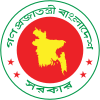City in Chittagong, Bangladesh
| Cox's Bazar কক্সবাজার | |
|---|---|
| City | |
 Cox's Bazar beach Cox's Bazar beach Hotel–Motel zone Hotel–Motel zone Cox's Bazar railway station Cox's Bazar railway station Cox's Bazar Airport Cox's Bazar Airport Cox's Bazar–Teknaf Marine Drive Cox's Bazar–Teknaf Marine Drive | |
 Seal Seal | |
| Nickname: City of Tourism | |
 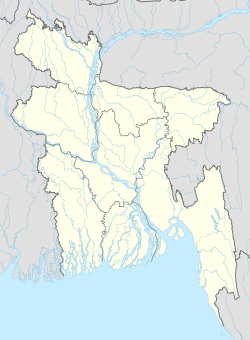 | |
| Coordinates: 21°25′38″N 92°00′18″E / 21.42722°N 92.00500°E / 21.42722; 92.00500 | |
| Country | |
| Division | Chittagong |
| District | Cox's Bazar |
| Named for | Hiram Cox |
| Government | |
| • Type | Mayor–Council |
| • Body | Municipality |
| • Administrator | Rubaiya Afroz |
| Area | |
| • Total | 23.4 km (9.0 sq mi) |
| Population | |
| • Total | 196,374 |
| • Density | 8,400/km (22,000/sq mi) |
| Time zone | UTC+6 (BST) |
| Postal code | 4700 |
| Airport | Cox's Bazar International Airport |
| Website | www |
Cox's Bazar (/ˌkɒksɪz bəˈzɑː/; Bengali: কক্সবাজার, romanized: Kôksbājār; pronounced [kɔksbadʒaɾ]) is a city, fishing port, tourism centre, and district headquarters in southeastern Bangladesh. Cox's Bazar Beach, one of the most popular tourist attractions in Bangladesh, is the longest uninterrupted naturally occurring sea beach in the world. Located 150 km (93 mi) south of the city of Chittagong, Cox's Bazar is also known by the name Panowa, which translates literally as "yellow flower." An old name was "Palongkee".
The city covers an area of 23.4 km (9.0 sq mi) with 58 mahallas and 27 wards and as of 2022 had a population of nearly 200,000. Cox's Bazar is connected by road and air with Chittagong.
The modern Cox's Bazar derives its name from Captain Hiram Cox, an officer of the British East India Company, a Superintendent of Palongkee outpost. To commemorate his role in refugee rehabilitation work, a market was established and named after him. It is one of Bangladesh's main tourist spots. In 2023 Bangladesh evacuated over 50,000 people to safe shelters as Cyclone Mocha approached. During the protest of 2024, around 10,000 tourists were stuck at Cox's Bazar.
History
During the early 9th century, the greater Chittagong area, including Cox's Bazar, was under the rule of Arakan kings until its conquest by the Mughals in 1666. When the Mughal Prince Shah Shuja was passing through the hilly terrain of the present-day Cox's Bazar on his way to Arakan, he was attracted to its scenic and captivating beauty. He commanded his forces to camp there. His retinue of one thousand palanquins stopped there for some time. A place named Dulahazara, meaning "one thousand palanquins," still exists in the area. After the Mughals, the place came under the control of the Tipras and the Arakanese, followed by the Portuguese and then the British.
The name Cox's Bazar originated from British East India Company (EIC) official Hiram Cox, who was appointed as the Superintendent of Palonki (today's Cox's Bazar) outpost. He succeeded Warren Hastings, who became the Governor of Bengal following the passage of the Regulating Act 1773. Cox embarked upon the task of rehabilitation and settlement for the Arakanese refugees in the area. He rehabilitated many refugees in the area, but died in 1799 before finishing his work. To commemorate him, a market was established and named after him, called Cox's Bazar. Cox's Bazar was first established in 1854 and became a municipality in 1869.
After the Indian Rebellion of 1857, Company rule in India came to an end and was replaced by the British Crown. As a result, Cox's Bazar was declared a district of the Bengal Province under the British Crown.
20th century
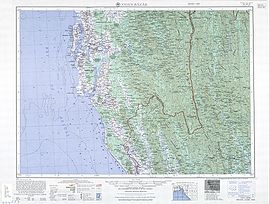
Just after the end of British rule in India in 1947, Cox's Bazar became part of East Pakistan. Captain Advocate Fazlul Karim, the first post-independence chairman of Cox's Bazar Municipality, established the Tamarisk Forest along the beach. He wanted to attract tourists as well as to protect the beach from tsunamis. He donated much of his father-in-law's and his own lands as sites for constructing a public library and a town hall. Karim was inspired to build Cox's Bazar as a tourist spot after seeing beaches of Bombay and Karachi, and was a resort pioneer in developing Cox's Bazar as a destination. Karim established a maternity hospital, the stadium and the drainage system by procuring grants from the Ford Foundation and Rockefeller Foundation through correspondence. T. H. Matthews, the principal of the Dacca Engineering College (1–49~1954), was a friend who had helped him in these fundraising efforts. Engineer Chandi Charan Das was the government civil engineer who worked on all these projects.
In 1959 the municipality was turned into a town committee. In 1961 the Geological Survey of Pakistan initiated investigation of radioactive minerals like monazite around the Cox's Bazar sea-beach area.
In 1971, Cox's Bazar wharf was used as a naval port by the Pakistan Navy's gunboats. This and the nearby airstrip of the Pakistan Air Force were the scene of intense shelling by the Indian Navy during the Bangladesh Liberation War. During the war, Pakistani soldiers killed many people in the town, including eminent lawyer Jnanendralal Chowdhury. The killing of two freedom fighters named Farhad and Subhash at Badar Mokam is also recorded in history.
After Bangladesh's independence, Cox's Bazar started to receive administrative attention. In 1972 the town committee of Cox's Bazar was once again turned into a municipality. In 1975, The Government of Bangladesh established a pilot plant at Kalatali. In 1984, Cox's Bazar subdivision was promoted to a district, and five years later (in 1989) the Cox's Bazar municipality was elevated to B-grade. In 1994 (jobs) the Marine Fisheries and Technology Station (MFTS) was established at Cox's Bazar. MFTS is a research station of Bangladesh Fisheries Research Institute (BFRI) headquartered in Mymensingh. The station covers a land area of four hectares and contains five laboratories.
21st century
In September 2012 the municipality was the site of the Cox's Bazar and Ramu riots, where local Muslims attacked the Buddhist community over an alleged Quran desecration posted to Facebook.
In 2017, hundreds of thousands of Rohingya refugees from Myanmar arrived in Cox's Bazar District, amounting to 725,000 in October 2018; the resulting Kutupalong refugee camp became the largest refugee camp in the world.
On 14 May 2020, the first confirmed case of COVID-19 was detected among the 860,000 refugees who lived in Cox's Bazar district.
In March 2021, a fire at the refugee camp left 15 dead and some 400 missing and displaced more than 45,000 mostly Rohingya refugees.
Additionally, the government is constructing 268 kilometers of roads to enhance rural connectivity in the region. This initiative includes building 40 new cyclone shelters, a relief administration and distribution center, and other facilities to bolster disaster resilience and support local populations.
Geography and climate
Cox's Bazar is located 150 km (93 mi) south of the divisional headquarter city of Chittagong. Cox's Bazar town has an area of 6.85 km (2.64 sq mi), and is bounded by Bakkhali River on the north and East, Bay of Bengal in the West, and Jhilwanj Union in the south.
The beach in Cox's Bazar has a gentle slope and with an unbroken length of 155 km (96 mi) it is often termed the "longest natural unbroken sea beach" in the world.
Cox's Bazar lies on a coastal plain in the southeastern corner of Bangladesh. From above, the plain appears to bulge out into the Bay of Bengal. Along the shore is an extensive area of beach and dunes. Most of the city is built on a floodplain that is lower in elevation than the dunes, making it more susceptible to flooding due to cyclones and storm surges. The Cox's Bazar coastal plain was formed after the sea reached its present level around 6,500 years ago, with the area of the current floodplain originally forming a sediment sink that has since been gradually filled in by the Bakkhali river as well as smaller streams coming down from the hills.
The climate of Bangladesh is mostly determined by its location in the tropical monsoon climate region: high temperatures, heavy rainfall, and generally excessive humidity, with distinct seasonal variations. The climate of Cox's Bazar is mostly similar to the rest of the country, but with an even wetter southwest monsoon season due to its coastal location. The annual average temperature in Cox's Bazar is a maximum of 30.1 °C (86.2 °F) and a minimum of 22.0 °C (71.6 °F). The average annual rainfall is 3,524 mm (138.7 in).
| Climate data for Cox's Bazar (1991-2020, extremes 1908-present) | |||||||||||||
|---|---|---|---|---|---|---|---|---|---|---|---|---|---|
| Month | Jan | Feb | Mar | Apr | May | Jun | Jul | Aug | Sep | Oct | Nov | Dec | Year |
| Record high °C (°F) | 32.0 (89.6) |
35.5 (95.9) |
37.4 (99.3) |
39.5 (103.1) |
37.5 (99.5) |
36.2 (97.2) |
34.8 (94.6) |
35.6 (96.1) |
37.0 (98.6) |
36.3 (97.3) |
34.8 (94.6) |
33.7 (92.7) |
39.5 (103.1) |
| Mean daily maximum °C (°F) | 27.1 (80.8) |
29.5 (85.1) |
31.9 (89.4) |
33.1 (91.6) |
33.1 (91.6) |
31.6 (88.9) |
30.8 (87.4) |
31.1 (88.0) |
31.7 (89.1) |
32.1 (89.8) |
30.8 (87.4) |
28.2 (82.8) |
30.9 (87.6) |
| Daily mean °C (°F) | 20.3 (68.5) |
22.9 (73.2) |
26.2 (79.2) |
28.4 (83.1) |
28.9 (84.0) |
28.0 (82.4) |
27.4 (81.3) |
27.6 (81.7) |
27.8 (82.0) |
27.6 (81.7) |
25.1 (77.2) |
21.6 (70.9) |
26.0 (78.8) |
| Mean daily minimum °C (°F) | 15.5 (59.9) |
17.8 (64.0) |
21.5 (70.7) |
24.5 (76.1) |
25.5 (77.9) |
25.6 (78.1) |
25.3 (77.5) |
25.4 (77.7) |
25.2 (77.4) |
24.6 (76.3) |
21.2 (70.2) |
17.1 (62.8) |
22.4 (72.3) |
| Record low °C (°F) | 10.3 (50.5) |
9.6 (49.3) |
15.5 (59.9) |
18.0 (64.4) |
20.2 (68.4) |
20.0 (68.0) |
21.2 (70.2) |
23.0 (73.4) |
22.6 (72.7) |
20.5 (68.9) |
15.5 (59.9) |
11.0 (51.8) |
9.6 (49.3) |
| Average precipitation mm (inches) | 6 (0.2) |
15 (0.6) |
38 (1.5) |
85 (3.3) |
346 (13.6) |
823 (32.4) |
987 (38.9) |
707 (27.8) |
420 (16.5) |
255 (10.0) |
54 (2.1) |
12 (0.5) |
3,748 (147.6) |
| Average precipitation days (≥ 1 mm) | 1 | 1 | 2 | 4 | 13 | 22 | 25 | 25 | 20 | 10 | 3 | 1 | 127 |
| Average relative humidity (%) | 72 | 71 | 75 | 78 | 80 | 87 | 89 | 88 | 86 | 82 | 77 | 74 | 80 |
| Mean monthly sunshine hours | 259.0 | 254.2 | 264.0 | 262.8 | 241.0 | 169.0 | 149.1 | 163.5 | 187.2 | 240.9 | 254.0 | 256.0 | 2,700.7 |
| Source 1: NOAA | |||||||||||||
| Source 2: Bangladesh Meteorological Department (humidity 1981-2010) | |||||||||||||
Demographics
| Religions in Cox's Bazar city (2011) | ||||
|---|---|---|---|---|
| Religion | Percent | |||
| Islam | 88.90% | |||
| Hinduism | 8.75% | |||
| Buddhism | 2.01% | |||
| Other or not stated | 0.34% | |||
According to the 2022 Bangladesh census, Cox's Bazar city had a population of 196,374.
According to the 2011 Bangladesh census, Cox's Bazar had 31,431 households and a population of 167,477. 38,042 (22.71%) were under 10 years of age. Cox's Bazar had a literacy rate (age 7 and over) of 55.72%, compared to the national average of 51.8%, and a sex ratio of 776 females per 1000 males. Ethnic population is 1,686 (1.01%), of which Rakhine were 1,447.
Educational institutions
1962: Cox's Bazar Government College is the earliest secondary and bachelor's degree offering college founded in Cox's Bazar.
1985: Cox's Bazar Law College is the first profession-based college founded in this district.
1991: Cox's Bazar Govt. Women's College is the first Secondary and bachelor's degree offering college in this district solely for women.
2006: Cox's Bazar Commerce College is the First College only for Business Studies, Humanities and Business Management.
2008: Cox's Bazar Medical College is the first medical college in this district.
2013: Cox's bazar international university is the first private university founded in this district.
The motto of the university is Enlightening Tomorrow.
Other colleges in this area: Cox's Bazar Polytechnic Institute, Cox's Bazar Technical School and College, Nursing & Midwifery College, Cox's Bazar, Cox's Bazar City College, Cox's Bazar DC College, Uttaran Model College Cox's Bazar, Cox's Bazar Harvard International College, BKSP RAMU Cox's Bazar, Ramu Cantonment Public School & College, Ramu Government College, Ukhiya Degree College, Women's College Ukhiya, Teknaf Government College, Moin Uddin Memorial College Nelah Teknaf, many more
High schools: Cox's Bazar Govt. High School, Cox's Bazar Govt. Girl's High School, Cox's Bazar Model High School, Bheola Manik Char High School, Ramu Cantonment English School, Ramu Khizari Govt. High School, Biam Laboratory School and College, Kishalaya Model High School, Chakaria korak biddyapith, Chakaria Govt. High School, Palong Model High School, Shilkhali High School, Pekua, Ukhiya Govt. High School, Nheela High School, Poura Preparatory High School.
- Sheikh Hasina Joarianala Girls High School, Joarianala, Ramu,Cox'sbazar
Economy and development
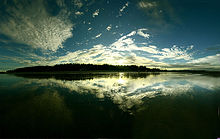
| Location | Cox's Bazar Bangladesh |
|---|---|
| Coordinates | 21°25′53″N 91°58′42″E / 21.431389°N 91.978306°E / 21.431389; 91.978306 |
| Tower | |
| Foundation | concrete base |
| Construction | metal skeletal tower |
| Height | 7 metres (23 ft) |
| Shape | square prism skeletal tower with balcony and lantern |
| Markings | white tower, orange lantern |
| Operator | Bangladesh Department of Shipping |
| Light | |
| Focal height | 54 metres (177 ft) |
| Range | 21 nautical miles (39 km; 24 mi) |
| Characteristic | Fl W 15s. |
The major economic activity in Cox's Bazar is tourism. A number of hotels, guest houses, and motels have been built in the city and coastal region, and many people are involved in the service industry. Oysters, snails, pearls and their ornaments are very popular with tourists and people are involved in the transportation business for tourists.
People are involved in fishing and collecting seafood and sea products for their livelihood. Cox's Bazar is one of the few major spots for aquaculture in Bangladesh. Along with Khulna, it is considered a major source of revenue from foreign exchanges. Besides a mix of small-scale agriculture, marine and inland fishing and salt production are other industrial sources that play important roles in the national economy.
In April 2007, as Bangladesh was connected to the submarine cable network as a member of the SEA-ME-WE-4 Consortium, Cox's Bazar was selected as the landing station of the submarine cable.
Transport

Road
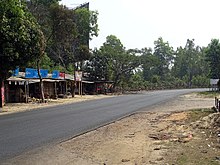
The N110 is the national highway that connects the city with country's capital and largest city Dhaka as well as with many other parts of the country via N1. Z1132 works as the alternative gateway from the Eidgaon part of the N1.
Travelling by bus to Cox's Bazar from Dhaka generally takes about 9–12 hours depending on the traffic.
In January 2024, two open top buses for tourists were launched, travelling from Laboni Point to Sabrang in Teknaf via Marine Drive.
Airport

The city of Cox's Bazar is served by Cox's Bazar Airport, located northwest of the city. It is one of Bangladesh's busiest domestic airports. The main airlines serving the airport are Biman Bangladesh Airlines, US-Bangla Airlines, Novoair and Regent Airways. In November 2020, Biman Bangladesh Airlines started flights between Sylhet and Cox's Bazar, which was the first direct flight between two cities without any connecting flight from Dhaka. Cox's Bazar Airport is in the process of being upgraded to an international airport in order to attract more tourists. This will make it the fourth international airport in Bangladesh.
Rail

The Cox's Bazar railway station is the main railway station of the district which provides trains on Chittagong–Cox's Bazar line operated by the state-run Bangladesh Railway. This station also provides trains that run from Dhaka, such as the Cox's Bazaar Express. In November 11, 2023, Prime Minister of Bangladesh Sheikh Hasina inaugurated the Cox's Bazar railway station. The station was opened to the public in December 1, 2023.
Sea
Nuniarchara has a jetty port for transport by sea.
Tourism

- Cox's Bazar Beach: The beach in Cox's Bazar is the main attraction of the town with an unbroken length of 150 km (93 mi) also termed the "longest natural unbroken sea beach" in the world. There are several 3 stars and 5 star hotels provide the exclusive beachside area with accessories for the tourist. Visitors in other hotels visit Laboni beach which is the area of the beach closest to the town. Other than the beach there are several places of interest near the town which can easily be visited from the town center.
- Himchari National Park : Himchari is located just south of the Cox's Bazar town. It consists of lush tropical rain forest, grasslands and trees, and features a number of waterfalls, the biggest of which cascades down toward the sandy, sun-drenched beach. The National Park was established in 1980 by the Government of Bangladesh as a conservation area for research, education, and recreation. Once it was the stomping grounds of herds of Asian elephant. It is still home to a limited number of these mammals.
- Aggmeda Khyang: a large Buddhist monastery, and a place revered by around 400,000 Buddhist people of Cox's Bazar; and the Chittagong Hill Tracts. The main sanctuary is posted on a series of round timber columns. It has a prayer chamber and an assembly hall along with a repository of large and small bronze Buddha images and a number of old manuscripts.
- Ramu: about 10 km (6 mi) from Cox's Bazar, is a village with a sizeable Buddhist population. The village sells handicrafts and homemade cigars. There are monasteries, khyangs and pagodas containing images of Buddha in bronze, gold and other metals with precious stones. One of the temples, on the bank of the Baghkhali River, houses relics and Burmese handicrafts, and also a large bronze statue of Buddha measuring thirteen feet high which rests on a six feet high pedestal. Weavers ply their trade in open workshops and craftsmen make handmade cigars in their pagoda like houses.
- Bangabandhu Sheikh Mujib Safari Park: Bangabandhu Sheikh Mujib Safari Park is the first Safari Park in Bangladesh. Dulahazara Safari Park was developed on an undulating landscape of around 2,224 acres (9.00 km2) of area at Chakaria Upazila in Cox's Bazar District. The nature of the forest is tropical evergreen and rich with Garjan, Boilam, Telsur, and Chapalish along with herbs, shrubs, and creepers. Safari Park is a declared protected area where the animals are kept in a fairly large area with natural environment and visitors can easily see the animal whenever they visit by bus, jeep or on foot. This park was established on the basis of South Asian model. This safari park is an extension of an animal sanctuary located along the Chittagong-Cox's Bazar road about 50 km (30 mi) from Cox's Bazar town. The sanctuary itself protects a large number of wild elephants which are native to the area. In the safari park, there are domesticated elephants which are available for a ride. Other animal attractions include lions, Bengal tigers, Crocodiles, Bears, Chitals and a variety of birds and monkeys.
The only aquarium in Bangladesh is in Cox's Bazar. Attractions also include parasailing, water biking, beach biking, horse riding, Cox Carnival circus show, Daria Nagar Ecopark, Cox's Bazar Development Authority, numerous architectural attractions, Shishu Parks and numerous photogenic sites. The largest safari park in the country, Bangabandhu Safari Park, is nearby. There is a forest reserve, Naf Tourism Park, which also has a cable car planned.
- Radiant Fish World: Radiant Fish World is a sea aquarium.
- Cox's Bazar–Teknaf Marine Drive: Its the road that goes to Teknaf from Cox's Bazar. There is a sea on one side and hill on the other.
In 2013, the Bangladesh Government formed the Tourist Police unit to protect local and foreign tourists better, as well as to look after the nature and wildlife in the tourist spots of Cox's Bazar.
Gallery
-
Cox's Bazar bus terminal
-
 Town view at Sugondha point
Town view at Sugondha point
-
 Beach area
Beach area
-
 Cox's Bazar in daylight
Cox's Bazar in daylight
-
 Cox's Bazar Sea Beach
Cox's Bazar Sea Beach
See also
References
- Rongmei, Precious. "Have you been to the longest beach in the world?". The Times of India. ISSN 0971-8257. Retrieved 12 September 2023.
- "Bangladesh's Cox's Bazar: A paradise being lost?". BBC News. 26 December 2012. Retrieved 30 April 2022.
- "Huge fire at Rohingya refugee camp leaves thousands without shelter | Bangladesh | the Guardian".
- "A Glimpse at Camp Life in Cox's Bazar: Examining Aid Response". 13 April 2023.
- "Area, Population of Cox's Bazar". citypopulation.de.
- "Cox's Bazar, Bangladesh". Encyclopædia Britannica. 12 January 2015. Retrieved 14 January 2008.
- কক্সবাজার জেলা [Cox's Bazar district]. coxsbazar.gov.bd (in Bengali). Retrieved 4 December 2018.
- "50,000 people evacuated in Cox's Bazar as cyclone Mocha approaches". Dhaka Tribune. 13 May 2023. Retrieved 13 May 2023.
- ^ Siddiqi, Mohammad Mahibbullah (2012). "Cox's Bazar District". In Islam, Sirajul; Jamal, Ahmed A. (eds.). Banglapedia: National Encyclopedia of Bangladesh (Second ed.). Asiatic Society of Bangladesh.
- Nandita Haksar (2009). Rogue Agent: How India's Military Intelligence Betrayed the Burmese Resistance. Penguin Books India. pp. 55–56. ISBN 978-0-14-306489-3.
- ^ Chowdhury, Sifatul Quader (2012). "Beach Sand Heavy Mineral". In Islam, Sirajul; Jamal, Ahmed A. (eds.). Banglapedia: National Encyclopedia of Bangladesh (Second ed.). Asiatic Society of Bangladesh.
- Alam, Badiul (2012). "Cox's Bazar Sadar Upazila". In Islam, Sirajul; Jamal, Ahmed A. (eds.). Banglapedia: National Encyclopedia of Bangladesh (Second ed.). Asiatic Society of Bangladesh.
- Kabir, SM Humayun (2012). "Bangladesh Fisheries Research Institute". In Islam, Sirajul; Jamal, Ahmed A. (eds.). Banglapedia: National Encyclopedia of Bangladesh (Second ed.). Asiatic Society of Bangladesh.
- "Bangladesh rampage over Facebook Koran image". BBC News. 30 September 2012. Retrieved 8 December 2019.
- "Cox's Bazar: The world's biggest refugee settlement". Norwegian Refugee Council. 21 May 2020. Retrieved 24 August 2018.
- Refugees, United Nations High Commissioner for (15 May 2020). "Public health response in Rohingya refugee settlements on alert as first coronavirus case confirmed". UNHCR. Retrieved 21 May 2020.
- Ramy Inocencio: At least 15 killed by huge fire at Rohingya refugee camp in Cox's Bazar, Bangladesh 23 March 2021 www.cbsnews.com accessed 23 March 2021
- "UN emergency fund allocates $14 million for Rohingya refugees left homeless by massive fire". UN News. 25 March 2021. Retrieved 28 March 2021.
- ভৌগলিক পরিচিতি – কক্সবাজার জেলা [Geographical Introduction - Cox's Bazar District]. coxsbazar.gov.bd (in Bengali). Archived from the original on 7 December 2018. Retrieved 4 December 2018.
- Alam, M.S.; Huq, N.E.; Rashid, M.S. (1999). "Morphology and Sediments of the Cox's Bazar Coastal Plain, South-East Bangladesh". Journal of Coastal Research. 15 (4): 902–908. JSTOR 4299010.
- Ahmed, Rafique (2012). "Climate". In Islam, Sirajul; Jamal, Ahmed A. (eds.). Banglapedia: National Encyclopedia of Bangladesh (Second ed.). Asiatic Society of Bangladesh.
- "World Meteorological Organization Climate Normals for 1991-2020". National Oceanic and Atmospheric Administration. Retrieved 13 June 2024.
- "Climate of Bangladesh" (PDF). Bangladesh Meteorological Department. Archived from the original (PDF) on 24 December 2018. Retrieved 24 December 2018.
- "Normal Monthly Humidity". Bangladesh Meteorological Department. Retrieved 31 January 2016.
- "41992: Cox's Bazar (Bangladesh)". ogimet.com. OGIMET. 1 December 2021. Retrieved 1 December 2021.
- ^ "Population & Housing Census 2011 (Zila Series & Community Series)". bbs.gov.bd. Bangladesh Bureau of Statistics.
- Population and Housing Census 2022 National Report (PDF). Vol. 1. Bangladesh Bureau of Statistics. November 2023.
- ^ List of Lights, Pub. 112: Western Pacific and Indian Oceans Including the Persian Gulf and Red Sea (PDF). List of Lights. United States National Geospatial-Intelligence Agency. 2016.
- ^ Rowlett, Russ. "Lighthouses of Bangladesh". The Lighthouse Directory. University of North Carolina at Chapel Hill. Retrieved 30 September 2016.
- Reeves, Peter. "The Development of Export-Oriented Shrimp Aquaculture in Bangladesh: a preliminary assessment of moves to more intensive production in southeastern Bangladesh". University of Edinburgh (Abstract). Archived from the original on 1 September 2005. Retrieved 1 February 2008.
- "Much needed Submarine Cable – Bangladesh". Bangladesh Development Gateway. 2 March 2006. Archived from the original on 20 April 2006. Retrieved 14 January 2008.
- "Online Road Network".
- "খুরুশকুল মাঝেরঘাট বেইলি সেতুর মরণদশা, ভয়ে ভয়ে পার হয় যাত্রীরা". Cox's Bazar Voice (in Bengali). 27 June 2024. Retrieved 30 September 2024.
- "Open top bus service for tourists starts in Cox's Bazar". The Business Standard. 10 January 2024. Retrieved 7 June 2024.
- "Biman to launch Sylhet-Cox's Bazar flight from Nov 12". Dhaka Tribune. 10 November 2020. Retrieved 7 January 2021.
- "'Cox's Bazar Airport to be made international one'". The Daily Star. 3 April 2012. Retrieved 11 April 2012.
- "Cox's Bazar International airport to be upgraded: Minister". The Daily Star. 26 March 2012. Retrieved 11 April 2012.
- "Expansion work of Cox's Bazar International airport to start this year: Minister". The Financial Express. Dhaka. 25 March 2012. Retrieved 11 April 2012.
- "Sujan: Tourism to improve when Dohazari-Cox's Bazar rail line completed". Dhaka Tribune. 12 September 2020.
- "PM inaugurates Chattogram-Cox's Bazar Rail line". Dhaka Tribune. 11 November 2023.
- "বাংলাদেশে আশ্রয় নেওয়া মিয়ানমারের ২৮৮ বিজিপি-সেনাকে হস্তান্তর". Banglanews24.com (in Bengali). 25 April 2024.
- Ethirajan, Anbarasan (26 December 2012). "Bangladesh's Cox's Bazar: A paradise being lost?". BBC World. Retrieved 29 January 2015.
- "Bangladesh: Tourism". The Europa World Year Book. Taylor & Francis. 2003. p. 679. ISBN 978-1-85743-227-5.
- Bangladesh, Tour to. "Welcome to Himchari National Park". tourtobangladesh.com. Archived from the original on 23 October 2018. Retrieved 4 December 2018.
- "Himchari National Park – A Birdwatcher's Paradise". Bangladesh.com. Retrieved 1 February 2015.
- Hossain, Mofazzal (2012). "Cox's Bazar". In Islam, Sirajul; Jamal, Ahmed A. (eds.). Banglapedia: National Encyclopedia of Bangladesh (Second ed.). Asiatic Society of Bangladesh.
- "BEZA to set up 9.5 km cable car route at Naf Tourism Park". The Independent. Dhaka. BSS. 22 March 2019.
- "Best Things to do in Cox's Bazar". Retrieved 26 October 2020.
- Mahmud, Tarek (31 August 2013). "Seashores to get tourist police". Dhaka Tribune. Retrieved 18 June 2015.
External links
Portals:| Cox's Bazar District | ||
|---|---|---|
| Capital: Cox's Bazar | ||
| Upazilas | ||
| Constituencies | ||
| Attractions and sites |
| |
| History | ||
| Inhabited areas | ||
| Educational institutions | ||
| Organisations | ||
| Transport | ||
